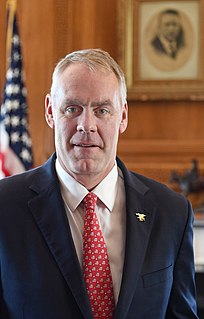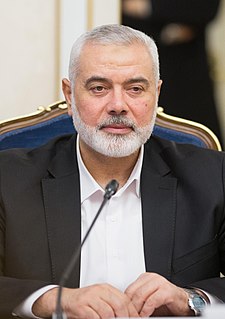A Quote by Hassan Nasrallah
The ones who were negotiating are now on the front line of this intifada, because they found that the negotiations didn't give them the minimum of their rights.
Quote Topics
Related Quotes
You have to negotiate from positions of strength. And right now with Iran, we're not negotiating from a position of strength. The Europeans are negotiating from the position of "Please give up your nuclear weapons program, and by the way if you do we'll give you several boatloads of carrots." The Iranians are quite willing to keep on negotiating on that line for a long time.
I told the President, I told Rahm Emanuel and others in the administration that I thought the policy they took to try to bring about negotiations is counter-productive, because when you give the Palestinians hope that the United States will do its negotiating for them, they are not going to sit down and talk.
You know, I think, I think the Palestinians are trying to get away without negotiating. They're trying to get a state to continue the conflict with Israel rather than to end it. They're trying to basically detour around peace negotiations by going to the U.N. and have the automatic majority in the U.N. General Assembly give them, give them a state.
Teddy Kennedy's big new idea is to wheel out his 18th proposal to raise the minimum wage. He's been doing this since wages were paid in Spanish doubloons (which coincidentally are now mostly found underwater). Kennedy refuses to countenance any risky schemes like trying to grow the economy so people making minimum wage get raises because they've been promoted. Kennedy's going down and he's taking the party with him! (Recognize the pattern?)
Every person with a pulse has a responsibility to stand in solidarity with the Muslim community that is on the front lines fighting against groups like ISIS, both militarily and ideologically, every day, and now on the front line of standing up for civil liberties and civil rights to make America great. [They] are the best insurance for the safety of all Americans.
The civil-rights movement was completely impossible to achieve. But look at what ordinary people were able to do because they were willing to sacrifice their lives to stay with it. They didn't expect a political process to respond to them. They made the political process respond to them. To say "It's so bad I won't bother" is to give up on your children and give up on your future.
We remember those who were called upon to give all a person can give, and we remember those who were prepared to make that sacrifice if it were demanded of them in the line of duty, though it never was. Most of all, we remember the devotion and gallantry with which all of them ennobled their nation as they became champions of a noble cause.
My problem with my parents growing up was not that I was afraid to cry in front of them - they always wanted me to cry because they wanted me to be okay, but it felt kind of icky and gross to cry in front of my parents. So my problem was the polar opposite - I didn't want to cry in front of them because I didn't want to give them the satisfaction.











































